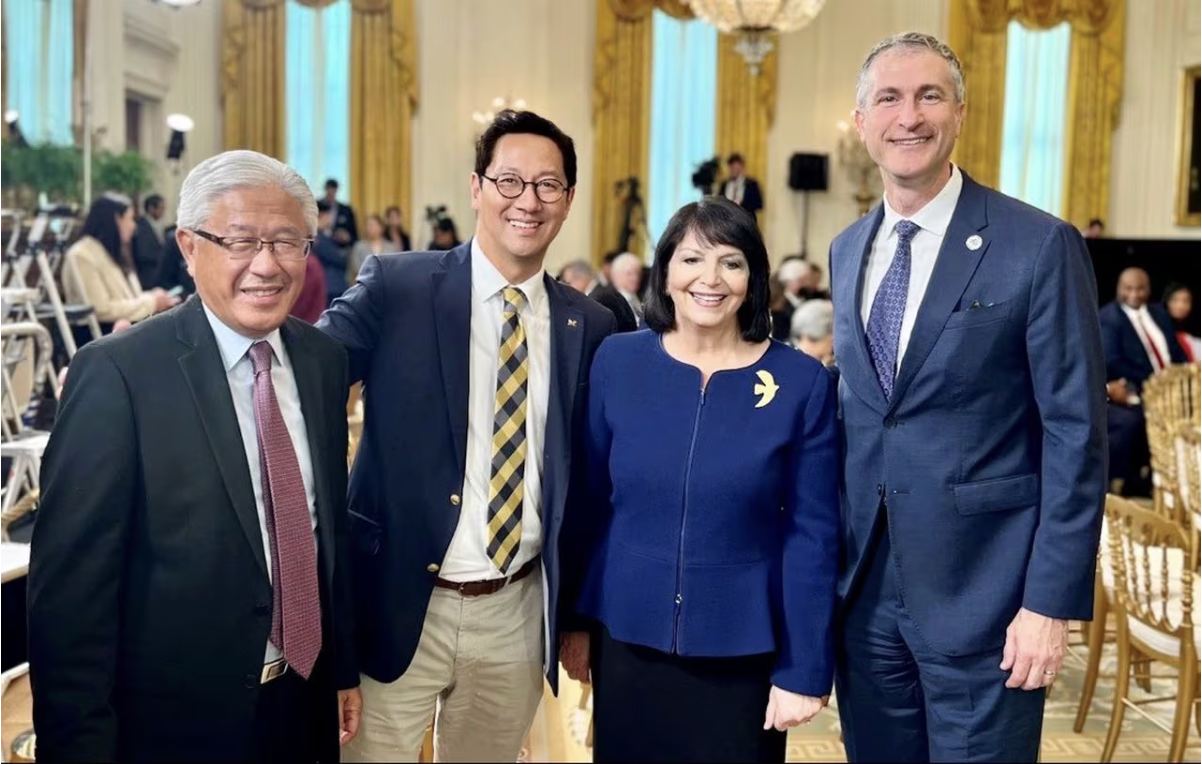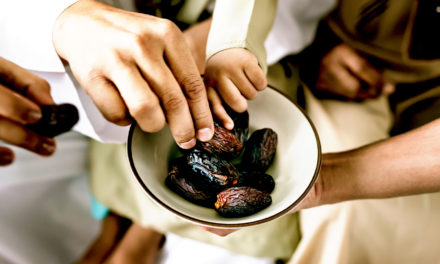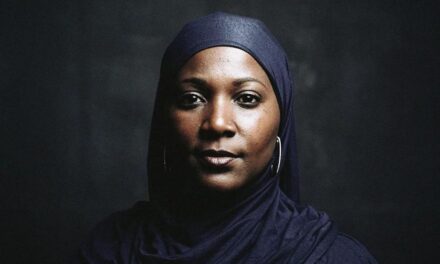University of Michigan professor Huda Akil, center right, at the White House ceremony awarding her and other scientists the National Medal of Science. From left to right, she is with National Academy of Medicine President Dr. Victor Dzau, University of Michigan President Santa Ono and Ann Arbor Mayor Christopher Taylor. Photo provided with permission to use by Akil.Huda Akil
ANN ARBOR, MI – How do we think? That question has fascinated Huda Akil since growing up in her home in Damascus, Syria.
The longtime University of Michigan neuroscientist first learned to think through her parents, she said. There was no limit to the questions she could ask them, which she said piqued her curiosity.
“They were my living Google,” Akil said.
Thinking is not an abstract idea, but a literal, biological one, according to Akil’s five decades of work that just earned her the nation’s highest science honor from President Joe Biden.
Akil, who works at the university Medical School and the Michigan Neuroscience Institute, was one of the awardees of the National Award of Science at a Tuesday, Oct. 24 ceremony at the White House.
Akil’s work seeks to understand how the brain functions during depression, anxiety, addiction and other mental conditions.
“A groundbreaking scientist studying neurobiology and emotions — we could use that badly,” Biden said.
Akil, humbled and grateful for the honor, saw it as a lifetime achievement award for her 55-year career in the United States.
“I’m especially grateful for all the opportunities the United States has given me to be a scientist and make contributions to our understanding of the brain,” she said.
Syrian girls were not encouraged to become scientists, Akil said, but she said her parents fostered her interest in the brain from an early age. Her father, who had a doctorate in educational psychology, and her mother who was an advocate for women’s education, did not “squash” her frequent science questions, she said.
“They really allowed me to ask questions, and when they didn’t know the answer, they took it seriously enough to go find out,” Akil said.
Akil was also inspired to pursue science due to her idol Marie Curie, the Nobel Prize-winning scientist from Poland and France.
“It really blew my mind that a woman could do that,” Akil said. “That a woman could go somewhere and become a scientist.”
Akil first thought language was the way to understanding how we think, studying it at the American University in Beirut in the 1960s. She later took a neuroscience course and found that the “biology of the brain” was a more concrete way to understanding thought.
Her love of Curie led Akil to Paris early in her career. However, a colleague of her father’s advised her to work in America for her graduate studies.
“You should go to America,” she remembers him telling her. “That’s really where the best science is.”
This story made Biden laugh at the ceremony, as he said this person advising her “had real wisdom.” Akil then earned her doctorate at the University of California-Los Angeles, as well as a postdoctoral fellowship at Stanford University.
Her time in America led her to her husband Stanley Watson. Their relationship blossomed while both studied at Stanford, and they later settled in Ann Arbor where they have lived for 45 years.
“University of Michigan always felt right in that it has very high standards of excellence, but it’s also very inclusive and very broad,” she said.
Watson and Akil have been, and continue to be, active scientific collaborators. He is a psychiatry professor at the Medical School and also a research professor at the institute.
As a child she was struck by the fact that Marie Curie collaborated with her husband, and won one of her Nobel Prizes with him, she said.
“It was a dream of mine to marry somebody that I could work with,” Akil said. “It was so weird that it actually happened that way.”
Watson and Akil still collaborate to this day, as the students that research and train under them are known as “Wakils,” or a portmanteau of their two surnames.
Akil’s work addresses two major issues — the opioid and mental health epidemics, she said. She has formed present-day understanding of how the brain naturally reduces pain, how stress affects the brain at the molecular level and how genetic and cellular differences may make someone more or less vulnerable to developing depression, anxiety or addiction.
In her brief interactions with Biden, she got the impression that his administration wants to deploy the country’s resources to combat mental health struggles such as depression or addiction.
“I am very passionate about the idea that we need to deploy our scientific knowledge to help people and partner with all kinds of entities…social workers, schools, federal government, medical professionals and families to help especially people who are really struggling,” Akil said.













